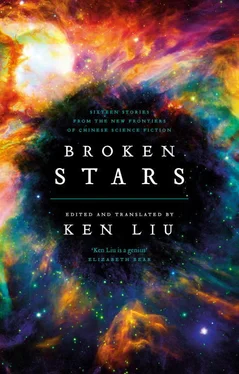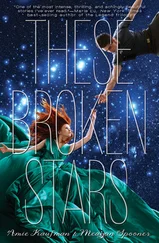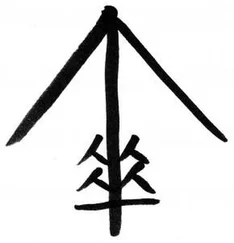Since I was feeling low during that time, I sought refuge in fiction and got into wuxia fantasies. The remake of Legend of the Condor Heroes , produced in Hong Kong, was very popular on TV. I had seen an older version when I was little but thought the remake was better, even though the budget clearly wasn’t as big. I borrowed wuxia books by Jin Yong, Gu Long, Liang Yusheng—I would have read Huang Yi’s books, too, but I couldn’t find them anywhere. [7] In our timeline, Jin Yong, Gu Long, and Liang Yusheng are three of the acknowledged masters of wuxia fantasy, and most of their best works were written before 1980. Huang Yi’s works rose to prominence later, in the 1990s.
Xiaobao was now old enough that he spent every day practicing “Eighteen Stages to Subdue a Dragon” along with the heroes on TV. Shen Qian got mad and told me that I was rotting our child’s mind. I had to switch to reading something else.
Science fiction was also popular. Ye Yonglie’s Little Know-It-All Roams the Future sold millions of copies, and Zheng Wenguang’s Toward Sagittarius was flying off the shelves. I gradually became a fan—only science fiction could liberate me from the weight of daily life and allow me to enjoy a little pleasure. It was too bad that there were so few Chinese science fiction books, and not many foreign works were being translated. I soon finished all the ones I could find.
Inspired by my reading, I tried my hand at writing and ended up with a book called Little Know-It-All Roams the Universe , which was a sequel to Ye Yonglie’s famous work. At first, I passed the draft among friends, but then I got to know a young man named Yao Haijun who helped me obtain Mr. Ye’s permission and found me a publisher. The story gained me a bit of fame, and I was called a “rising star of science fiction.” Encouraged, I wrote another book called Little Know-It-All Roams the Body , which was meant to teach readers some interesting facts about the human body. Unfortunately, this book caused a lot of controversy: some argued that I was stealing too much from Ye Yonglie; some suggested I was tarnishing Chinese science fiction with portrayals that encouraged lascivious thoughts; still others claimed that my work was an example of capitalist liberalism and contained metaphors criticizing the Communist Party…. [8] This is a bit of an inside joke for Chinese SF fans. In our timeline, Yao Haijun is the executive editor for Science Fiction World , China’s (and the world’s) biggest sci-fi magazine by circulation. Baoshu, the author of this story, began his career as a fanfic author in the universe of Liu Cixin’s “Three-Body” series.
I was writing at a fairly turbulent time when ideological debates were on the rise. There were even sporadic student movements again. The central leadership probably wanted to create the opportunity for another purge, so they initiated an effort to cleanse society of “spiritual pollution.” I became a target and was severely criticized. Luckily, the government wasn’t interested in having the “pollution-cleaning” spin out of control, and I wasn’t punished much. However, it was impossible for me to be published anymore. I had to go back to the textbooks and prepare for the graduate school examination again.
It was only later that I understood how fortunate I had been. The country was also undergoing a movement of “intensive crackdown.” This involved every aspect of life: purse-snatchers were handed death sentences, while public dancing carried a charge of indecency. Liu Xiaobo found himself in trouble because he had several lovers and was executed by firing squad. When she heard the news, Shen Qian was depressed for a long time.
After the intensive crackdown, society grew even more conservative. Many things that used to be common became crimes: cohabitating without being married, kissing in public, wearing revealing clothes, and so forth. Given the shift in mainstream culture, I dared not write about sensitive areas again. Thus did my career as an author come to an end.
9.
Just as weal can lead to woe, misfortune can also lead to lucky breaks. A prominent professor turned out to be a fan of my novels and specifically requested me during the admission process. As a result, I became his graduate student and returned to school the next year.
At my mentor and advisor’s suggestion, I chose Sartre’s existentialism as my topic. Although many people had been studying it, most explanations were half-baked. After so many years wasted drifting in society, I treasured the opportunity to study in depth. I read many foreign books in the original languages—taught myself French—and published a few papers that were well received. Eventually, with my advisor’s recommendation, I was given the precious opportunity to study overseas at a famous university in America at the government’s expense.
This was the first and last time in my life I lived outside China. Visiting this country on the other side of the Pacific that people both loved and hated was quite an experience. The university was in New York, the greatest city on Earth. When I was little, I saw a ton of TV shows and movies set in New York: Beijinger in New York , Godzilla … and I had long wanted to visit. The sights and sounds of the city—skyscrapers, overpasses, highways, subways—were overwhelming.
I remembered the Beijing of my childhood as a prosperous city comparable to New York, but for some reason, after a few decades, New York remained a modern metropolis while Beijing had declined precipitously. I saw in America many goods that had long ceased to be findable in China: Coca-Cola, KFC, Nescafé… These were the brands I grew up with, and I indulged in a bit of nostalgia. I finally understood why so many people preferred to leave China for the US and not return.
However, I could also see signs that America was on the decline. At the time of my visit, a new blockbuster had just been released: Star Wars Episode IV: A New Hope . I remembered seeing Episodes I through III when I was little and had always wanted to find out what would happen next. To reexperience the wonder of my childhood memories, I bought an expensive ticket. But Episode IV turned out to be far less spectacular than the previous three, and the special effects were so bad that you could almost see the strings on the spaceships. I was really disappointed. Apparently the Cold War had drained America’s resources into the arms race, and the economy wasn’t doing so well.
Unlike in the past, opportunities for exchanges between America and China were growing scarce. It was almost impossible to visit America on your own, and even government-sponsored trips were rare. There were only a handful of Chinese from the mainland in the entire university. To celebrate my arrival, they held a party for me, and as we enjoyed our french fries, they asked me how things were in China. Since it took almost a full month for international mail to reach the recipient and phone calls were extremely inconvenient, they got most of their information about China from English-language news reports, which tended to be so narrow in scope that it was like trying to understand a beach by observing a few pebbles. We reminisced about how when we were little we could chat with friends on the other side of the globe just by opening a window over the web, and it felt like another age, another world.
While we were discussing rumors about the transition of power from Deng Xiaoping to Hua Guofeng, a dark horse about whom little was known, the doorbell rang. A woman stood up and said, Oh, it must be so-and-so —but I didn’t catch the name. She went and opened the door and a woman came in, limping with the aid of a cane. I gave her a curious glance, and when I saw her face, I froze.
Читать дальше












